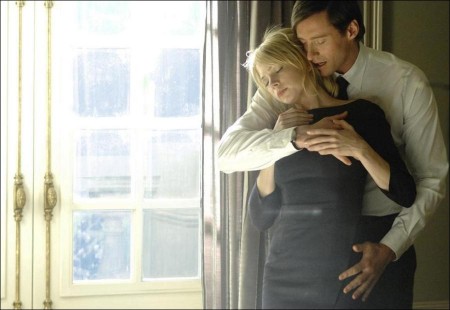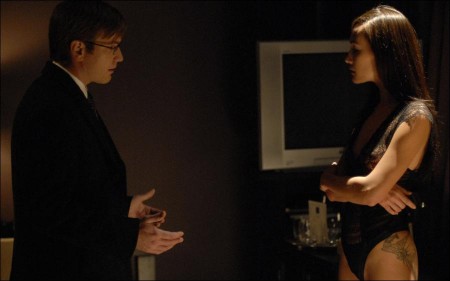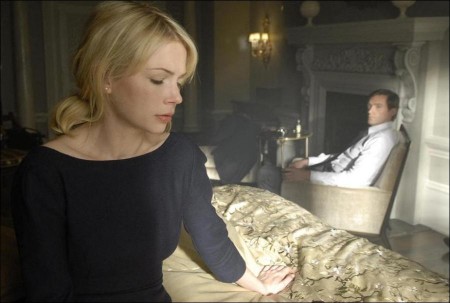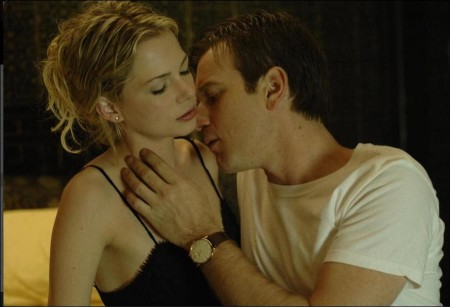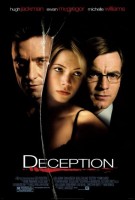Tagline: Are you free tonight?
A simple enough question, but how Jonathan McQuarry (Ewan McGregor) answers it will change his life forever. A corporate auditor adrift in a sea of New York’s power elite, Jonathan’s work is his entire life. But a chance meeting with Wyatt Bose (Hugh Jackman), a charismatic corporate lawyer, introduces Jonathan to a decadent playground for Manhattan’s executive upper crust. For these power brokers, whose eighteen-hour workdays leave no time for a personal life, there’s “The List” — a sex club, of sorts, where the right cell-phone number and four simple words (“Are you free tonight?”) can lead to an evening’s sexual fulfillment.
It’s a world of “intimacy without intricacy,” as Jonathan’s first conquest (or vice versa) explains to him, and through The List Jonathan discovers a side of himself that he didn’t know existed. But an affair with a ravishing and mysterious stranger known to Jonathan only by her first initial ‘S’ (Michelle Williams), will expose him to yet another world he never imagined — one of betrayal, treachery and murder.
DECEPTION’s thriller elements, and the way they are tied to its theme of solitude, intrigued director Marcel Langenegger. “It was such a great, smart script, with intriguing mind games. And Jonathan is so susceptible to such things, I think, because he’s so lonely. You can really feel his loneliness.”
Screenwriter Mark Bomback (Live Free or Die Hard) had first pitched DECEPTION to producer Arnold Rifkin, over coffee. “I bought it before our cups were empty,” says Rifkin, who was drawn to the thriller’s unconventional elements and characters. “The innocence of the story really got to me,” Rifkin says. “This young man, Jonathan, leads a life of anonymity. There are thousands and thousands of people like Jonathan, people who are cut off from others, who are stuck being alone.”
Producer John Palermo sees DECEPTION as something of a throwback to an earlier era of filmmaking. “I think the film is proof that thrillers can actually be character-driven stories,” Palermo says, “with themes that are relevant and with characters you care about.”
Hugh Jackman, who stars as Wyatt Bose, a lawyer who pulls Jonathan out of his psychological confinement, appreciated the story’s new take on the sexual thriller. “I thought there was something very fresh about the script,” Jackman says. “It was smart and sexy, and it takes you to a world that you never get to see. Many thrillers push credibility to the limit. But I thought that this is something that could happen; this world could exist. Because even with our cell phones and our Blackberrys people still feel disconnected and lonely, just like Jonathan. He’s someone that people can relate to, and his journey in this movie is so terrific. He really comes alive.”
Ewan McGregor, who plays Jonathan, agrees. “DECEPTION is a very well-crafted story, and I was really struck by Jonathan and how he’s so cut off from life. That’s not the usual sort of character to have at the heart of a thriller.”
McGregor embraced the role because Jonathan is a very untraditional protagonist. “For one thing,” he notes, “people have conversations in his space like he’s not there. He’s someone who’s so cut off from the world, who hasn’t allowed himself to feel emotional ties to people, that when he falls for ‘S,’ I think he falls really hard. It’s quite a deep love story. In many respects, playing Jonathan was like an unpeeling. It was like playing a flower opening up — different levels of him becoming alive.”
McGregor notes that director Langenegger, too, connected with Jonathan’s journey. “Marcel has talked a lot about this idea of Jonathan being born,” McGregor says. “Like him becoming alive. And DECEPTION really is about the stages of that. Sometimes, through terrible experiences you can grow, and I think the nightmare of what happens to Jonathan is what allows him to come out on the other end, transformed. He’s kind of set free. It’s about him coming to life, really.”
Life comes much easier to Jonathan’s new friend, Wyatt Bose. Hugh Jackman describes the role as “a fairly Machiavellian character. He’s manipulative, smart, charming, enigmatic and mysterious. Wyatt has the confidence that he owns the world. He’s the kind of guy you want to be around.
Jackman, who also serves as a producer on the picture, was eager to explore the character’s many facets — even completely unexpected ones. In one scene, Langenegger recalls, he decided to give Jackman a bit of “indirect direction,” and so he suggested that Wyatt should think of Jonathan as a cockroach. “Hugh took that little idea, and he used it to transform the scene,” Langenegger says.
“All actors love to play shadier characters,” Jackman says. “And these are parts I don’t get to play a lot. With Wyatt, you’re not quite sure what his motives are at any point in time, you just have the feeling that, enticing and enigmatic as he is, you probably shouldn’t be going along with him. It might lead to trouble.”
And so it does — for Jonathan and for the woman known to Jonathan only as “S.” “She makes bad decisions because she’s with the wrong people,” says Michelle Williams. “She’s a gypsy and a fly-by-night kind of girl. I’d never played anybody quite like her before, so ‘S’ was a new challenge for me. ‘S’ is aggressive and confident and capable and sexual. These are all things I haven’t really explored before. And then she comes into her own at the end of the film. She has a self, and she has the promise of an altering love.”
Langenegger knew Williams was ‘S’ the first time they met. “She sat in front of me and she was just raw,” he recalls. “I saw this vulnerability. She was so exposed and fragile, and yet there was so much power. On the surface, the character seems like a standard femme fatale in a thriller — the beautiful woman who is part of some kind of plot. But I wanted to give ‘S’ a greater depth, add something that is not expected in a role like that. And Michelle’s vulnerability is perfect for ‘S.'”
Landing Williams for the part wasn’t easy. ” I told her, ‘This is your role,'” says Langenegger. “You meet Jonathan for the first time, and you’re like a teenager who’s just discovered there’s something called love. This is why your character is so difficult and so wonderful and so beautiful.’ And then she said, ‘Yeah, I’ll do it.'”
One role that Langenegger didn’t have to worry about casting for was the “character” of New York City. As producer David Bushell puts it: “New York plays a lead character in DECEPTION, and we all knew we had to film it here.” Though parts of the film are shot in Madrid, around La Plaza Mayor and the Paseo del Prada, there’s no denying that New York plays an essential part in DECEPTION.
Says Langenegger: “When we scouted for locations in, for example, offices or hotel rooms, we tried to find places that also offered a view of the city that would isolate Jonathan. I tried to find locations where we could see Jonathan in his glass box, and outside is Manhattan, the beautiful world that he has not been a part of.”
To create a look that would capture the film’s sensuality, thrills and unconventional characters, Langenegger and director of photography Dante Spinotti used Panavision’s new Genesis digital video camera. It was a choice that initially spurred much debate — Langenegger had wanted to shoot in film, while Spinotti preferred digital.
“It was interesting,” says David Bushell, “that we had this new-school, younger filmmaker [Langenegger] who wanted to stick with film, the old technology, and this old-school, giant of his profession [Spinotti] who was all for embracing the new, digital technology.” Finally, the two reached a compromise: Langenegger and Spinotti decided to split the film, roughly, into night and day. For the day, they would shoot film; for the night scenes, they shot with Genesis. (In the end, they shot some of the day sequences with Genesis as well).
Spinotti explains his preference for the Genesis camera: “What the Genesis camera does is capture the world of darkness and of night, so that we could really explore the visual world that goes from evening into the next morning.”
Typically, when a scene is shot at night, the set is flooded with so much light, that it can almost resemble daylight. The Genesis camera, however, works well using only available light. “The Genesis has a much stronger sensitivity,” Spinotti explains, “so it can read in the shadows much more than film does. Because of that, you can approach images in a different way. You can capture the fascination of what already exists, without having to modify it. It makes the whole film much more believable.”
Again mixing the “old” with the “new,” Spinotti and Langenegger used traditional Ziess lenses with the Genesis camera. When shooting with film, they used newly-developed Prima lenses. “We sort of took the edge off the digital image by using older lenses, and we tried to shoot the film image as sharp as possible, with Prima lenses, to better match the digital image,” Langenegger explains. “Our general idea was to get as close as possible to the fine grain of 70mm film.”
Acclaimed production designer Patrizia von Brandenstein and costume designer Sue Gandy also made significant contributions to the film’s look. “The character of Jonathan works at different companies every three or four days,” von Brandenstein says, “but he is never part of the life of the corporation he’s visiting. So, in a sense, these offices are all the same. There are subtle differences in levels of prosperity, I suppose, but in essence it is all just the ‘corporate world.’ But when he discovers the wilder side of New York, through Wyatt, I wanted to show how enticing it was to him, but also that it was dangerous. So that world is full of bright, reflective surfaces and colors, but there is darkness underneath.”
Gandy, too, found herself trying to convey the differences between Jonathan’s two worlds. “There are splashes of red here and there, plus splashes of blue and gold. The inspiration for my clothing designs does come from Hitchcock films and film noir — using color only where it can make a statement. Marcel showed me photographs of the city, of how he wanted things to look. Lots of steely, New York cab colors, blood colors and vibrant blues.”
The result is a thriller that re-imagines the genre while simultaneously paying homage to it. “What Marcel, Dante, and the entire team, have done,” says Jackman, “is give DECEPTION a moody and intimate atmosphere. It’s almost dreamlike, in a way. It’s incredibly sexy, and the whole film kind of seduces you. It doesn’t rush you, it’s not formulaic in that normal thriller way. It just kind of draws you in.
“At the same time, it is a real roller-coaster ride. It’s smart, there are a lot of twists and turns, and it takes you on one hell of a ride.”
Production notes provided by 20th Century Fox.
Deception
Starring: Hugh Jackman, Ewan McGregor, Michelle Wiliams, Maggie Q, Natasha Henstridge
Directed by: Marcel Langenegger
Screenplay by: Mark Bomback, Jason Keller, Patrick Marber
Release Date: April 25th, 2008
MPAA Rating: R for sexual content, language, brief violence and some drug use.
Studio: 20th Century Fox
Box Office Totals
Domestic: $4,598,506 (37.4%)
Foreign: $7,680,791 (62.6%)
Total: $12,279,297 (Worldwide)
